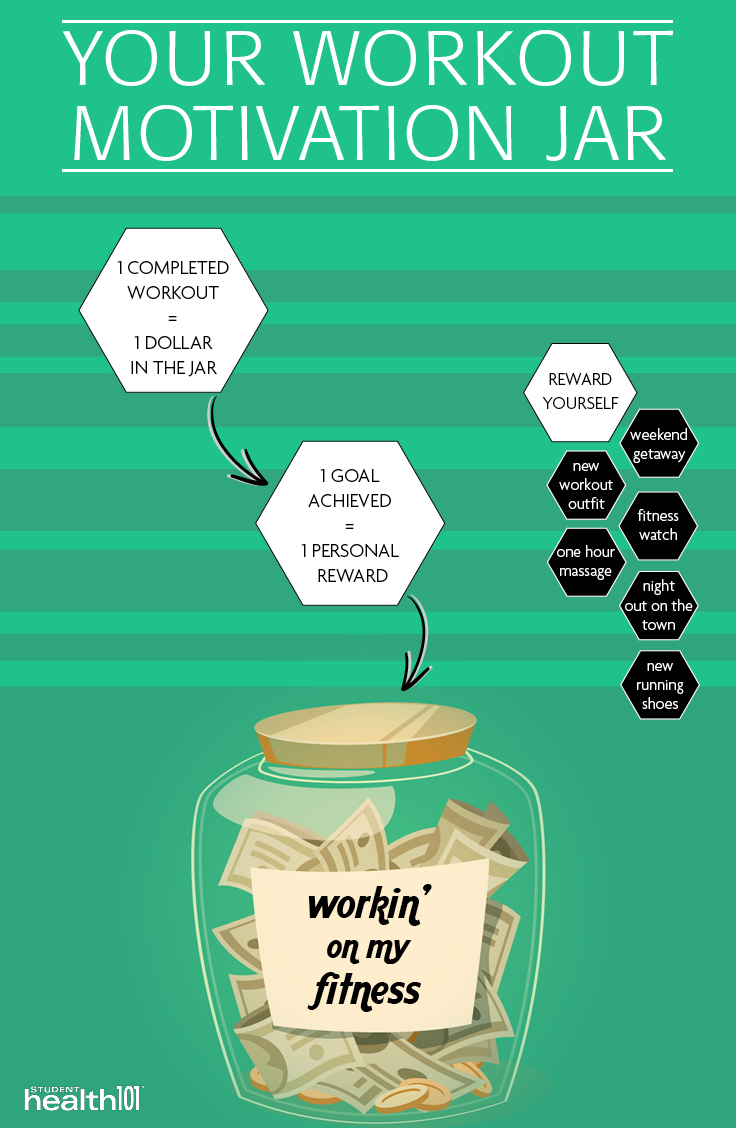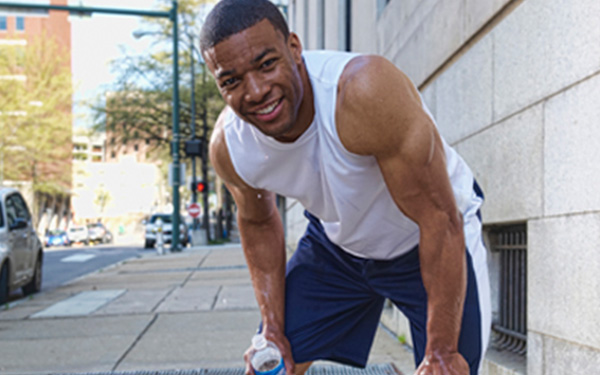Find your drive to exercise
Take the quiz
 |
Struggling to start strength training or show up for cardio combat class? Our quiz helps you figure out how to maximize your workout motivation
studentvoice

QUESTION 1
You’ve been inactive for a year and want to start working out again. You struggle with negative body image, and take an all-or-nothing approach to diet and exercise.
- Buy a FitBit so you can see how your daily steps add up. Sign up for email newsletters highlighting the value of moderate exercise.
- Go big: Find a six-month training program for a marathon or triathlon.
- Find some friends and family members who are active and get close to them. Physical activity is contagious.
WHAT WAS YOUR ANSWER?
A: GREAT
Successful fitness plans are realistic, with small steps and attainable goals. Factoring in the value of what you’re already doing makes the change seem less intimidating. The newsletters might help, but targeted messages are more powerful. To find a tracking device or app that works for you, check out Wellocracy.com.
B: GRIM
Big goals don’t work well for most people, and your all-or-nothing history shows the pitfalls. Shift to a more consistent approach and more realistic goals. If you keep getting stuck, consider exploring cognitive behavioral therapy.
C: GREAT
This kind of positive peer pressure often works. Hanging out with active people makes you more likely to be active yourself.

QUESTION 2
Your doctor has advised you to lose weight. When you were younger, you enjoyed running, but you’re having a hard time seeing yourself getting back in that kind of shape.
- Ask a sibling to send you images of heavy guys caught in unflattering poses, for motivation.
- Find a close friend who’s willing to walk/run together on Sunday afternoons and Wednesday mornings, extending the distance and ramping up the pace as you build endurance.
- Take swim lessons and start swimming laps. The 10-block walk to the pool is a good warm-up.
WHAT WAS YOUR ANSWER?
A: GRUESOME
As a motivational strategy, body-shaming fails. There are far more effective (and less demoralizing) tactics than this.
B: GREAT
A solid plan. Focusing on an activity you’ve enjoyed before will help you get comfortable and confident. Making a specific plan and seeking social support will hold you accountable. Finally, the approach allows you to up the ante as your fitness improves.
C: GRIM
Behavior change has to be as easy as possible, and the 10-block schlep means you’ll have excuses not to follow through. It’s too hot. It’s too cold. It’s raining. I can’t find my walking shoes. Plus, learning to swim is a major prerequisite—and if you struggle, your plan’s dead in the water.
QUESTION 3
Crystal, a colleague you know from the office next door, has moderate cerebral palsy and uses leg braces. She mentioned this week that she wants to build upper body strength and generally tone up.
- Invite her to come with you to the local gym and spot each other on the free weights.
- Suggest she invests in basic fitness equipment so she can exercise without anxiety or self-consciousness. Alternatively, help her search online for a special needs gym.
- Let her know how inspirational she is for even thinking about it. Turn her photo into a Facebook meme.
WHAT WAS YOUR ANSWER?
A: GREAT
This plan is practical, social, and inclusive. You’re right on the money.
B: GRIM
People with disabilities are routinely marginalized and excluded. Don’t tell yourself it’s for their own good. It isn’t.
C: GRUESOME
Disability advocates call this “inspiration porn.” It’s condescending. Why should you be amazed and impressed that Crystal wants to do something with her life?
QUESTION 4
You share your apartment with Dave, your partner of three years, who is having a hard time getting to his adult soccer league (Mondays and Thursdays) this year. On top of his usual workload, he’s filling in for a coworker and is involved in the care of his sick father who lives 25 miles away.
- Understand how pressured his life is currently. Let him know it’s okay to wait until he has more time for this.
- Post a calendar inside the bathroom door with Yay soccer!! highlighted on the relevant days. Ask him to take you along.
- On Thursdays, use your free hour to tackle the household chores that usually fall to Dave. Let him know that on your way to class, which passes the pharmacy, you can pick up his dad’s medication.
WHAT WAS YOUR ANSWER?
A: GRIM
Sympathy is a fine thing, but right now Dave needs soccer. Getting back into the game would give him a break from the pressure, restore his social connections, and keep him physically and mentally healthy.
B: GREAT
The calendar presents a plan and serves as a cue to action—two meaningful strategies. Joining Dave for soccer is reinforcing and rewarding for both of you, while adding accountability. Just make sure the calendar doesn’t become so familiar that you both start tuning it out: Switch up your cues.
C: GREAT
Providing invisible support is an act of true support. You’ve identified the barriers Dave faces, and you’re helping reduce them—without drawing attention to yourself or insisting that he use the time to play soccer. (It’s great if he does, but sometimes that might not be an option.)

QUESTION 5
Cal, a guy you met through your online psychology class, has a family history of chronic illness. He worries that a sedentary lifestyle further increases his risk, but has trouble sustaining his motivation to be active.
- Do an online search for information on heart disease and diabetes. Send him links to credible resources.
- Understand that it’s been difficult for him growing up with his relatives as role models. Give him regular pep talks on willpower. If he wants this enough, etc.
- Show him websites and apps that provide customized messages and evolving goals, tailored suggestions for working out, and a fun way to track his activity.
WHAT WAS YOUR ANSWER?
A: GRIM
Health information alone rarely enables people to change their behavior. Instead, help Cal identify the barriers to exercise (practical, psychological, financial, etc.) and figure out ways to minimize them. Key: What would make this easiest for him?
B: GRUESOME
This isn’t a motivational strategy; it’s bullying.
Judging and shaming his family, and implicitly Cal himself, won’t achieve anything good.
Anyway, willpower is a finite, inconsistent resource. It’s rarely enough for sustained behavior change.
C: GREAT
As we make progress, we benefit from evolving messages, strategies, and tools (a concept captured in the Stages of Change behavioral model). Starting small helps a lot, and self-tracking is motivating. Check out the liveWell wellness program for students.
QUESTION 6
Issa enjoys motocross and snowboarding, but right now those are beyond her budget. Instead, she’s sitting around watching reality shows (she enjoys those, too).
- Let her know that Jillian Michaels (formerly of The Biggest Loser) is in town for a free YOLO Boot Camp and workout DVDs. Ask Issa to come with you.
- Join her to watch a show about people training for a triathlon, and discuss whether you could do it.
- Join her for two reality shows a week. Turn them into social workouts, with pedicures to follow. (Bonus: Reality shows make more sense when viewed upside down through your legs in Downward Dog.)
WHAT WAS YOUR ANSWER?
A: GREAT
Issa is hooked in to popular culture and likes to be ahead of the crowd. When influential people spearhead activities and campaigns, there’s a social ripple effect. Here, Jillian Michaels is poised to turn Issa onto her new fitness approach, and Issa in turn might introduce it to others. In addition, you’re making a specific plan and working out together—two keys to successful outcomes.
B: GRIM
A triathlon is a major training commitment, difficult to integrate with academic responsibilities and your competing priorities at work or at home. Big goals = bigger chance of failing. And it sounds as though the conversation is too vague to lead anywhere. Be realistic in your goals and make a plan.
C: GREAT
Capitalizing on Issa’s existing routine goes a long way, and so does working out together. You’ve realized the value of fun and rewards. Terrible TV, pedicure, and friendship: How much easier can a workout get?
studentvoice






